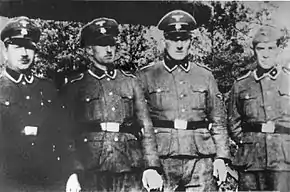Josef Hirtreiter
Josef Hirtreiter (1 February 1909 – 27 November 1978) was an SS functionary of Nazi Germany and a Holocaust perpetrator who worked at Treblinka extermination camp during the Operation Reinhard phase of the Holocaust in Poland.[1][2]
Josef Hirtreiter | |
|---|---|
 | |
| Born | 1 February 1909 |
| Died | 27 November 1978 (aged 69) |
| Allegiance | |
| Service/ | |
| Rank | Scharführer |
| Unit | SS-Totenkopfverbände |
| Commands held | Treblinka extermination camp |
SS career
Hirtreiter was born in Bruchsal. After elementary school, he worked as unskilled construction worker and bricklayer. He failed the exam in lock-picking.[3] On 1 August 1932 he became a member of the Nazi Party and Sturmabteilung (SA). After the invasion of Poland, in October 1940 he was assigned to the Hadamar Euthanasia Centre where he worked in the kitchen. In summer 1942 he joined the army. Four weeks later he was sent back to Hadamar, and then to Berlin from where Christian Wirth transferred him to Lublin reservation camp complex back in occupied Poland. There, he acquired the rank of SS-Scharführer and was shipped to Treblinka death camp. Hirtreiter served at Treblinka II from October 1942 till October 1943 at the camp-zone 2 Auffanglager receiving area. He monitored naked women, before gassing them.[4] Later, he served at the Sobibór extermination camp.[3]
After the closing of Treblinka in October 1943, Hirtreiter was ordered to Italy where he joined a police unit for the so-called anti-partisan "cleansing" operations. His death camp superior, Franz Stangl, went there in order to set up the Risiera di San Sabba killing centre in Trieste.[5]
Trial and conviction
Hirtreiter was arrested by the Allies in July 1946 for having served at the euthanasia centre in Hadamar, but was released due to lack of incriminating evidence. He was re-arrested in 1951 after testimony of Treblinka prisoner Szyja (a.k.a. Sawek,[6] or Jeszajahu)[7] Warszawski, who survived in a burial pit wounded, and slipped away under the cover of night, but in his 1946 testimony misspelled Hirtreiter's name as Hitreider.[4][6] Hirtreiter was charged in March 1951 at Frankfurt am Main, and convicted in the torture slaying of prisoners. He was the first of the Treblinka extermination camp SS-men who were tried over a decade later at Düsseldorf in West Germany. He was sentenced to life imprisonment on 3 March 1951 for killing children; many aged one to two, during the unloading of the transports notably, by grabbing them by their feet and smashing their heads against the walls of boxcars.[6][8] Hirtreiter was released from prison in 1977 due to illness. He died 6 months later in a home for the elderly in Frankfurt.[3]
References
- Kopówka, Edward; Rytel-Andrianik, Paweł (2011), "Treblinka II – Obóz zagłady" [Monograph, chpt. 3: Treblinka II Death Camp] (PDF), Dam im imię na wieki [I will give them an everlasting name. Isaiah 56:5] (in Polish), Drohiczyńskie Towarzystwo Naukowe [The Drohiczyn Scientific Society], ISBN 978-83-7257-496-1, archived from the original (PDF file, direct download 20.2 MB) on 2014-10-10,
with list of Catholic rescuers of Jews imprisoned at Treblinka, selected testimonies, bibliography, alphabetical indexes, photographs, English language summaries, and forewords by Holocaust scholars.
- Arad, Yitzhak (1987). Belzec, Sobibor, Treblinka. The Operation Reinhard Death Camps (Google Books preview). Bloomington, Indianapolis: Indiana University Press. ISBN 0253213053.
- ARC (23 September 2006). "The Treblinka Perpetrators". An overview of the German and Austrian SS and Police Staff. Aktion Reinhard Camps ARC. Retrieved 25 May 2015.
Sources: Arad, Donat, Glazar, Klee, Sereny, Willenberg et al.
- Dr. iur. Christian Hofmann (4 July 2006), "Die Treblinka-Prozesse." Strafsache gegen Josef Hirtreiter. Zukunft braucht Erinnerung. Retrieved 25 May 2015.
- Michael Bryant (15 May 2014). Eyewitness to Genocide: The Operation Reinhard Death Camp Trials, 1955–1966. Univ. of Tennessee Press. pp. 84–85. ISBN 978-1621900498.
- The Treblinka Death Camp Trials, S.J., H.E.A.R.T 2007.
- Sprawiedliwi z powiatu wołomińskiego (Righteous from Wolomin). Archived 2014-10-29 at the Wayback Machine Jeszajahu (Szyja) Warszawski rescued by Serafinowicz family. Fakty.wwl, 24 February 2012.
- Szyja Warszawski H.E.A.R.T 2007. Evidence to the United Nations War Crimes Commission presented by the Polish Main Commission for the Investigation of German Crimes in Poland (now IPN). Excerpts in English, Warsaw, 1946. Vol. I, p. 196.